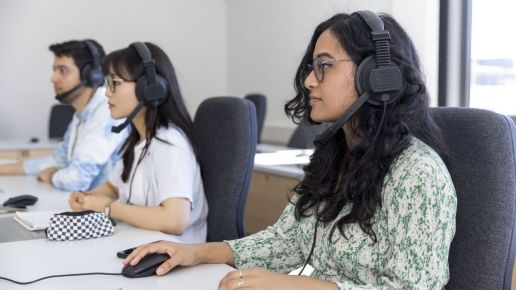Linguistics and cultural studies

When dealing with text and information, linguists and cultural scientists are in demand as experts – both in the advertising sector and in international cooperation. In a global, knowledge-based world of work, their skills are becoming increasingly important. It is important to know that prospective humanities scholars should be able to work on their own initiative at German universities.
Linguistics and cultural studies belong to the humanities. Around 2,750 degree courses are available at German . What they all have in common is that they deal with human cultural output with regard to languages, literature, philosophy and history. In addition to general and applied linguistics or individual languages, such as English language and literature, this subject group comprises and from fields as diverse as library science, cultural/social anthropology, journalism and history. Foreign language didactics in the subject German as a foreign language (GFL) is another example.
Organisation: Planning your timetable alone
Students should definitely have a love of reading and a keen feel for languages. They should also be able to organise themselves well, as a humanities degree course in Germany is more openly structured than in other countries. Students have a large amount of freedom to choose and combine learning content in linguistics and cultural studies subjects. Independent work in the library or learning groups and preparation for and are also significant components of the degree course.
On bilingual degree courses, good German language skills are also a prerequisite. Many degree courses offered in the subject group of linguistics and cultural studies allow an international double degree at German universities. From applied linguistics to Franco-German cultural studies, Bachelor's and Master's students find attractive combinations of various cultures and languages.
Range of courses: Single-subject Bachelor or individual combination?
Those who decide to study the humanities in Germany have the choice between a single-subject Bachelor, which concentrates on one subject only, or a combination of several subjects. A two-subject Bachelor opens up the possibility of selecting another subject that matches the student’s individual interests and establishes a focus, in addition to the main linguistics or cultural studies subject. This subject can be from the humanities, but it can also be a subsidiary from a completely different subject area, such as economics. The combinations available are dependent on the courses offered at the various universities.
subjects which are part of the “Digital Humanities”, such as computer linguistics, are booming. On the interface between linguistics and computer science, students investigate how texts and linguistic information can be processed using algorithms. Machine processing of linguistic content has been part of daily life for some time. Examples include search engines and voice-controlled navigation devices. This opens up new opportunities to language and information experts in the digital knowledge economy.
Career prospects: A wealth of jobs for humanities scholars
The job market for humanities scholars is developing positively. Their profound ability in knowledge management and cross-cultural skills are increasingly valued in a wide variety of economic sectors. The media and communications sector, educational institutions and publishers are the traditional areas of employment. In Germany, around a quarter of graduates now work in areas with rather less direct relationships to the humanities, e.g. the manufacturing industry, commerce or healthcare, and increasingly in IT.
Finding a job can be hard: only a few jobs explicitly target linguists and cultural scientists, which doesn’t make the search easy. In these areas, it is therefore particularly important for students to find their orientation during their studies and specialise in terms of course content. With a clear profile and initial practical experience, it is possible to make a good impression in this sometimes difficult phase. Many universities support students and offer modules that provide key qualifications and practical skills.